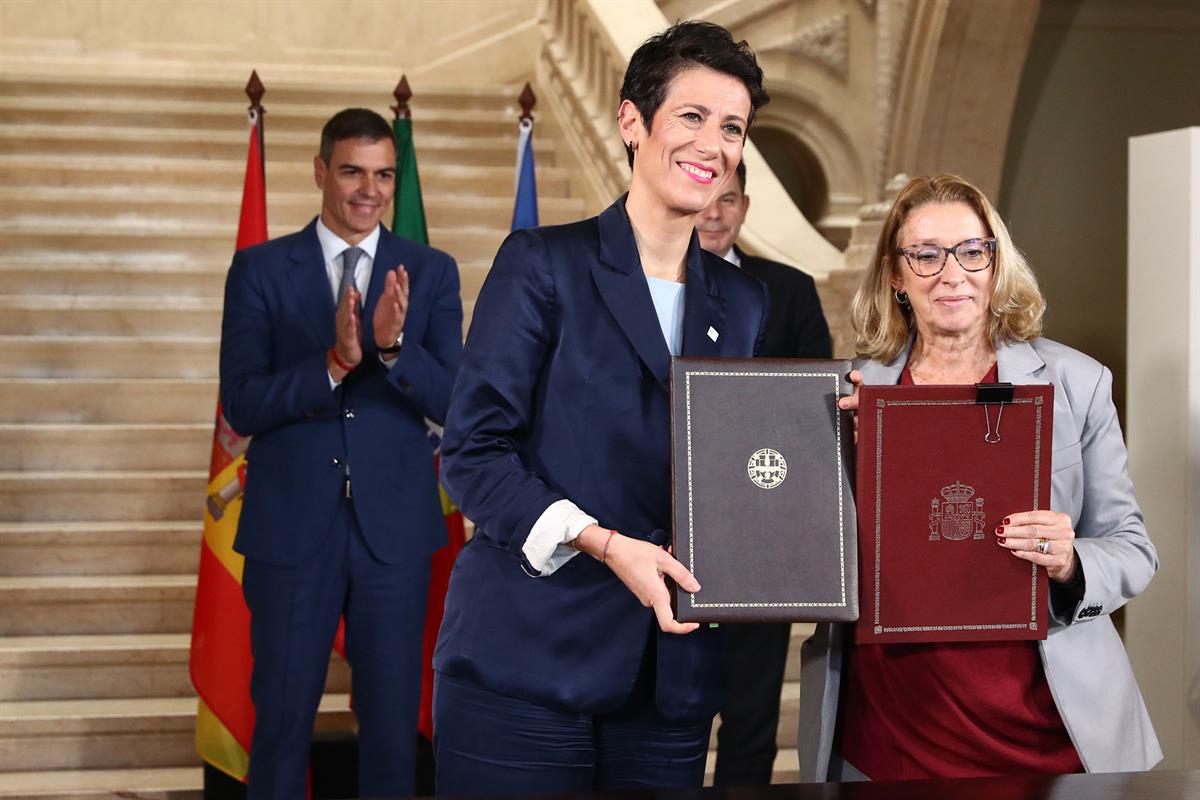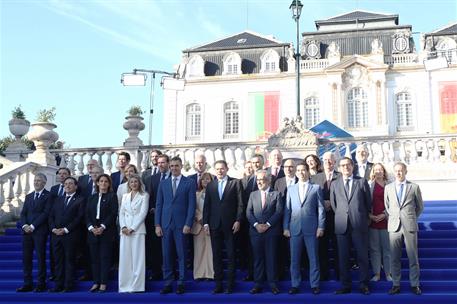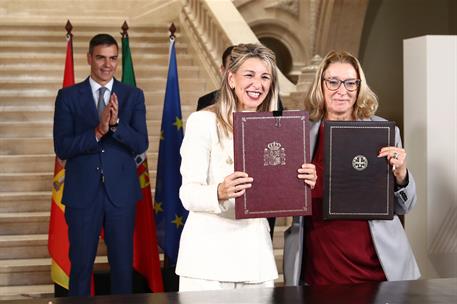Thirty-fifth Spanish-Portuguese Summit
Spain and Portugal commit to furthering cooperation and the exchange of best practices related to Social Security and Inclusion
News - 2024.10.23
 The Minister for Inclusion, Social Security and Migration, Elma Saiz, and her Portuguese counterpart after the signing of the bilateral agreements (Pool Moncloa/Fernando Calvo)
The Minister for Inclusion, Social Security and Migration, Elma Saiz, and her Portuguese counterpart after the signing of the bilateral agreements (Pool Moncloa/Fernando Calvo)
The Government of Spain has participated in the Thirty-fifth Spanish-Portuguese Summit, held in Faro (Portugal), whose delegations have been led by the President of the Government of Spain, Pedro Sánchez, and the Prime Minister of the Portuguese Republic, Luís Montenegro.
In addition to participating in the plenary, Elma Saiz, Minister for Inclusion, Social Security and Migration, held two bilateral meetings with the Minister for Labour, Solidarity and Social Security, Maria do Rosário, and with António Leitao Amaro, Minister of the Presidency, where they discussed the next steps for collaboration between the two countries in the various areas of the portfolio.
Pensions and the Policy Laboratory, key in the fight against poverty
Minister Elma Saiz and Maria Do Rosário, Portugal's Minister for Labour, Solidarity and Social Security, have signed a declaration of intent in which they commit to deepening cooperation in Social Security and Inclusion, areas in which they are already working intensively together.
"This is a privileged forum to strengthen cooperation links, also in common and strategic sectoral areas," explained Saiz. "Coordination between our two countries is essential to ensure the competitiveness of our economies, to guarantee the quality of life of our populations and to address our common social protection challenges."
Both ministers shared the importance of working on the sustainability of pension systems. In this respect, Elma Saiz explained to her counterpart the functioning of the intergenerational solidarity mechanism and the solidarity quota included in the latest reform of the pension system. She also pointed out that pensions alone, revalued by this Government in line with price rises (CPI), have prevented 8.6 million people from falling into poverty, with two million family members or people who, without being direct pensioners, benefit from their protective action.
In addition, Saiz and Do Rosário agreed on the need to update the guide for cross-border workers and the agreement on the control of deaths. They have also shown a shared concern about poverty. In this respect, Minister Saiz explained the functioning of the Inclusion Policies Laboratory, a project that aroused the interest of the Portuguese minister, who invited her to share its results at the OECD ministerial meeting to be held in February 2025, which will be co-chaired by Spain and Portugal. "It will be a unique opportunity to reflect on our common challenges," said Saiz. "We expect Portugal and Spain to continue to play an active and collaborative role in the definition of social policies, both at an EU level and in the different multilateral forums in which we participate."
Migration, a shared humanitarian approach
The meeting with the Portuguese Ministry of the Presidency confirmed the harmony between the two countries in their approach to migration policies. A "humanist and regulated" approach, in the words of Minister António Leitao, which also takes integration into account as a relevant issue and which has shown great interest in learning about the results of circular migration projects, such as Wafira, developed with Moroccan women who come to our country to train in entrepreneurship and to work in seasonal fruit picking, and return with the necessary knowledge to start or continue their own business in Morocco.
"It is essential to address migration management with a comprehensive approach, including respect for human rights, regular migration channels and an effective preventive external dimension through dialogue with source and transit countries based on the principle of mutual trust," said Elma Saiz.
As part of this approach, officials from both countries stressed the positive impact of orderly migration on the economy and the labour market, and the importance of working towards sustainable inclusion with the future of second and third generations in mind. For her part, the minister invited her to get to know the Plan for Integration and Intercultural Coexistence that the Ministry is currently developing and which will be published soon.
Non official translation






